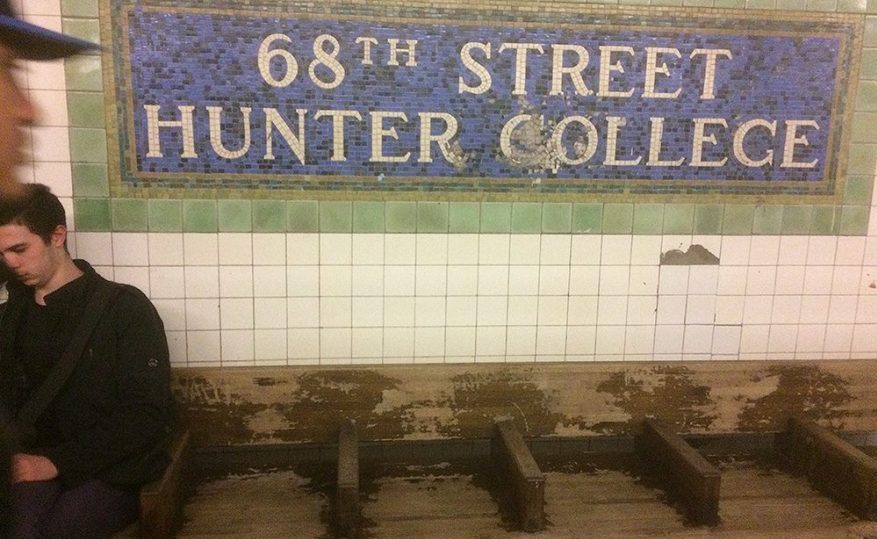Sixth in a series of articles about the early weeks of the first semester.
After a long day of classes on a warm Friday, I head out with my select interviewees to a dinner in an Olive Garden. We choose the one in Queens Center Mall because its prices are cheaper than those in Manhattan. The aesthetics of the moment – enhanced by good food and optimism – create a good mood for interviewing students about their impressions and experiences the first few weeks of the semester.
Note: I was advised by my editor to address the issue of transparency early on in this article. I’m the Ambassador of Eugenio Maria de Hostos Puerto Rican and Multicultural Club. I recruit members and ensure that everyone feels at home in the club. So, I thought it would be cool to interview Hostas members. It would be cool, my editor suggested, to make readers aware of my dual roles at Hunter, that I wear several hats as a student, journalist and club official, in the event the issue of impartiality is ever raised because I chose to interview club members. Other student journalists wear more than one hat and they have to be on the alert that their multiple roles don’t conflict in this tight community.
The SPJ Code of Ethics
On with my story. I start with Sara Mohamed, 21, sitting next to me in the Olive Garden. She is an Egyptian Muslim in her fourth year, majoring in political science and hoping to graduate this coming spring. She lives in Astoria, Queens. She is wearing a black shirt with overalls at the time of this interview.

Sara Mohamed. Picture provided by Sara Mohamed
“My first days back are overwhelming,” she says. She has less responsibilities this year because she is no longer President of Eugenio Maria de Hostos Puerto Rican and Multicultural Club. “With graduation in the spring, there is zero room for failure,” she says.
Mohamed wants to become a diplomat for a developing country, such as where her dad came from, Egypt. “I want to be their voice,” she says. Her backup plan is to be a human resources representative for the United Nations.
While that U.N. role may not include the politics of her major, she insists that “what many do not realize is that there is politics in everything, meaning my degree provides me skills for everything and anything my heart desires. As I am a natural leader, there is nothing that I cannot be prepared for.”
I move on to Andriy Repik, picture right, an Ukrainian junior majoring in computer science. He is 19 and lives in Borough Park, Brooklyn. Wearing a green hoodie with jeans at the time of this interview, he says returning to Hunter is “a weird transition from working all summer and then coming back to school.” He worked at a summer camp and dealt with what he called reckless elementary school boys every day.

Picture provided by Andriy Repik
“It’s good to see friends more often now, but less time for them as well with all the work load. I’m not excited for this semester,” he says with a grimace. He hopes his studies in computer science help land him a job with a tech company. “Google would be amazing,” he says. His backup would be to continue with English and become a teacher.
Says Kiara Tavarez, 19, Dominican, a junior majoring in psychology: “The first few days back at Hunter were confusing and overwhelming.” She was speaking about the psychological transition from working all summer as an employee to a daily school routine as a student. Yet, Tavarez, wearing a black shirt with jeans at the time of this interview, is looking forward to the school year. The elected Secretary of Hostos, says:

Picture provided by Kiara Tavarez
“To be perfectly honest, there’s a lot I could potentially go into with my major. My current main goal is to receive a PhD in child development, and go into research and become a professor. However, I am also very interested in specializing therapy for young adults; children and family therapy as well.
Overall, my interests revolve around child development because I am a strong believer that our childhoods shape who we are at people. The beginning stages of life are the most crucial, and I believe I could have a real impact and change the lives of so many children for the better.”
Tavaraez, picture left, also says, “I could either work on helping those children directly through therapy, or going into research and finding more ways our childhoods affect us and teach those methods to fellow psych majors.”
“With all the potential my future holds, I am beyond excited to see what life has in store for me regardless of what path I choose to take.”
Eileen Cruz can be reached at eileen.cruz50@myhunter.cuny.edu

Members of the Eugenio Maria de Hostos Puerto Rican and Multicultural Club. Photographer unknown.
